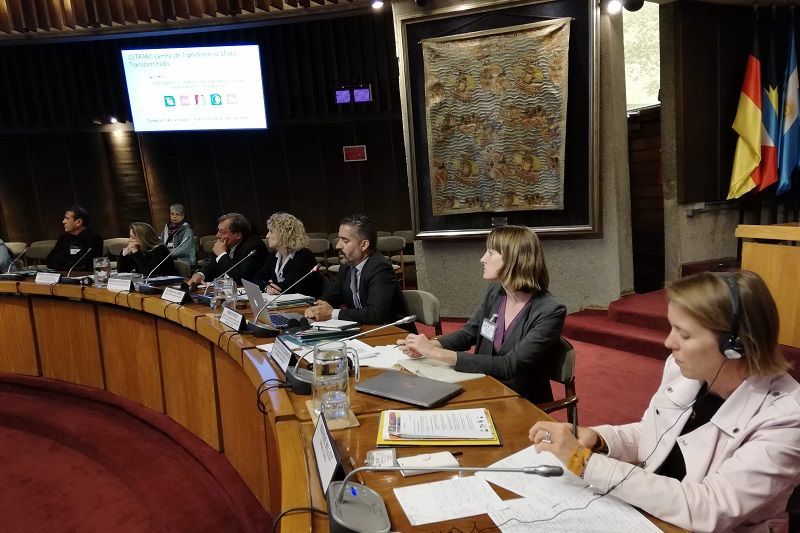Santiago, Chile. October 17, 2018. Initiatives supported by EUROCLIMA+ were presented for the development of urban mobility plans and policies in Latin America and the Caribbean, under the framework of the Second Conference of Cities at the headquarters of the Economic Commission for Latin America and the Caribbean (ECLAC), in Santiago, Chile.
EUROCLIMA+, the flagship programme of the European Union for climate change that promotes exchange between Europe and 18 Latin American countries, organised two sessions for the first day of the event. During October 16-19, countries of the region shared experiences in the implementation of pilot projects supported by the Programme’s Urban Mobility component, led by the French Development Agency (AFD) and the German Society for Cooperation International (GIZ).
In the first working session, Chile, Ecuador and Uruguay showed that the creation of their National Urban Mobility Policies and Programmes (NUMP) are an essential tool for stimulating and facilitating national level action on urban mobility.
“Sustainability is not only environmental, it also considers a social component, tangible and intangible heritage, and other aspects, which present many challenges in the formulation of public policies for sustainable mobility,” said Galo Cardenas, a transport expert for Ecuador’s Ministry of Transport and Public Works.
In the second session, seven cities of Latin America and the Caribbean with pilot projects for Sustainable Urban Mobility Plans (SUMP), addressed the challenge of implementing these plans in urban centres where the automotive fleet continues to grow. “In our city there are people who can have up to four cars, this does not make any sense,” said Hugo Pizarro of the Regional Government of Antofagasta, Chile.
About the Conference of Cities
The Second Conference of Cities, co-organised by ECLAC, the Assembly of Ministers and Highest Authorities on Housing and Urban Development of Latin America and the Caribbean (MINURVI) and UN Habitat, was inaugurated by Cristián Monckeberg, Chile’s Minister of Housing and Urban Development, and Mario Cimoli, Deputy Executive Secretary of the regional commission of the United Nations, with the participation of Chiara Di Giulio, representative of the European Union in Chile, and the moderation of Joseluis Samaniego, Director of the Sustainable Development and Human Settlements Division of ECLAC.
Minister Cristian Monckeberg stated that “sustainable urban mobility is essential for people to be happier and have a better quality of life in their cities”.
Mario Cimoli said that, for ECLAC, the issue for the cities “should become a matter of public policy, it should be a matter that allows governments to see the new paradigm that not only deals with mobility, the city, and individuals, but also with technology, productive activity and everything that is required for sustainable long-term growth. Without structural change, this will not be achieved.”
Joseluis Samaniego, Director of ECLAC’s Sustainable Development and Human Settlements Division, indicated in this regard that “cities have an enormous role to play in innovation, and they could become a driver of sustainable development.”
The focus of this latest Conference is the integration between urban planning, management, financing, and mobility and transport systems in Latin America and the Caribbean to achieve sustainable urban development, as part of the Regional Action Plan for the implementation of the New Urban Agenda (NUA) in the region.
More information about EUROCLIMA+
EUROCLIMA+ is a programme funded by the European Union to promote environmentally sustainable and climate-resilient development in 18 Latin American countries, particularly for the benefit of the most vulnerable populations. The Programme is implemented under the synergistic work of seven agencies: Spanish Agency for International Development Cooperation (AECID), French Development Agency (AFD), Economic Commission for Latin America (ECLAC), Expertise France (EF), International and Ibero-American Foundation for Administration and Public Policies (FIIAPP), German Society for International Cooperation (GIZ), and UN Environment.
During the first nine months of 2018, the different components of the programme have experienced significant progress in their project selection processes. A total of 32 have been selected in the areas of Urban mobility (19), Forests, biodiversity and ecosystems (8), and Disaster risk management (5), for approximately 25 million euros. This process is expected to be completed during the first quarter of 2019, to reach a total of approximately 57 projects. In addition, the Climate governance component is carrying out regional actions and initiatives in 14 different countries.
Press contacts:
-Alexandra Cortés. Programa EUROCLIMA+: This email address is being protected from spambots. You need JavaScript enabled to view it.

